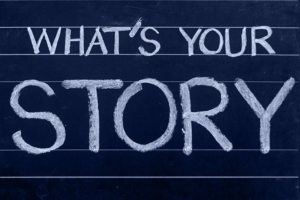Cut through the hype about brand storytelling
Every time I see the words “brand storytelling” and read about its importance, I get butterflies in my stomach—not the good kind. And I’m a professional writer, so I can only imagine what it’s doing to marketers out there who don’t write for a living.
Here are examples of the phrases that get me:
- “Content Marketing Storytelling: Secrets from the Big Screen”
- “Storytelling Secrets From Hollywood”
- “Create Your Brand Journey”
- “The customer is the one you want to take on the journey”
What’s everyone saying here? That you have to be a Hollywood genius in order to craft some kind of journey with secrets from the big screen that weave a compelling…
OK, let’s cut the bull.
Here’s the deal, plain and simple.
Even if you work for a big brand or company, no business starts out big. They all start small. Someone had an idea. Who were they? What did they like? Not like? What were their hobbies, passions, and foibles? What did they do to turn that idea into a business? What did they set out to achieve? Did they do it? Get sidetracked? Have to change completely?
And how about now that you’re there? Does the company still stand for the same thing? Do the same thing? Why has it changed, and how? What do the people who buy what you sell buy today? The original thing? Something new? Why are you passionate about the place? (Assuming you are. If you’re not, don’t bother with storytelling their brand. Brush up your resume instead.)
If you work for yourself, you know your story.
It may be weird to suggest that you sit down and talk about how your childhood transformed you into the business person you are today, but that’s what respected “brands” the world over are doing. Telling their personal stories. How their backgrounds made them who they are, transformed them, brought them here, to be available to sell you the goods or service they offer you today. Who you are is your differentiation. No one can steal your story. (Well, they can, but it’s not their brand, it’s plagiarism.)
Here’s another of those phrases that goes along with “brand storytelling” that gets the hairs on my arms up. “Emotionally connected.” What does that mean anyway?
Simply this. I shouldn’t just hear your story, I should feel it. Joyful. Empathetic. Inspired. Sad. Angry. Something that’s in my heart, not just in my head.
Here’s an example. I’m writing for a fashion designer right now. You’ve seen her beautiful leather purses and wallets, no doubt. They’re gorgeous. And expensive. Not only has she built a successful brand, she’s studied the business side and teaches students how they can start their own fashion and luxury brands. Is her story to students solely about her elegant merchandise? No. It’s about how, as a child growing up poor in Bulgaria, she watched her grandfather handcraft leather saddles, her grandmother hand-sew clothes. And in a time in a country without brands, how an American fashion magazine came into her hands, and changed her life. How she realized that she wanted and needed to create beauty.
Is your story that exotic? Maybe not. But that doesn’t matter. Dig in. Talk about your passion, or the passion with which your company delivers. And if you can’t be passionate about the brand you work for, get out. There’s no point. You can’t fake it.
Robert Rose says “In 2012 and beyond, the main reason you will be successful is because you have a specialized expertise — and because you can create a differentiated experience for your customers with that expertise. You (ideally) have a passion for the BIG idea that this expertise represents, and you’ve asked the question, ‘What business are we really in?’”
OK, now go tell your story. Or ask someone like me to help. (Seriously. If these terms are enough to make even a professional writer like me forget what it is I’m supposed to do, no one can blame you if you’re staring at a blank page, scratching your head.)
About the author
 Karen is a freelance San Francisco Bay Area copywriter that can help you get more sales, more leads, more subscribers and more awareness for your brand and business.
Karen is a freelance San Francisco Bay Area copywriter that can help you get more sales, more leads, more subscribers and more awareness for your brand and business.
Whether you’re local, across the nation or across the globe, she will give you solutions that help you succeed and drive your customers to take action.
From direct marketing to big ad campaigns, she uses the right words in an engaging, persuasive way (that’s copywriting) to get you leads, new customers, and repeat customers who buy again and again.
This article was first published by Karen Gordon Goldfarb



